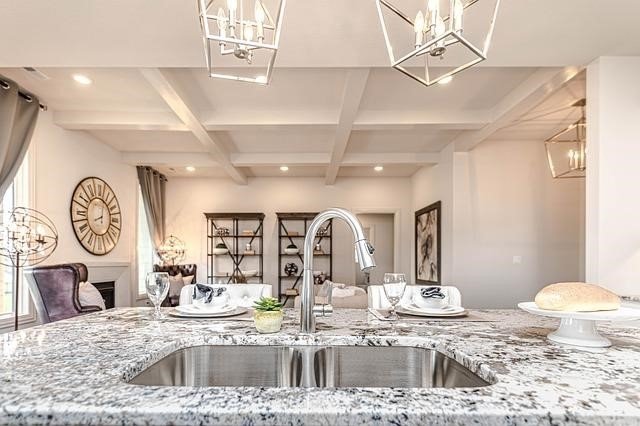Table of Contents Show
When it’s time to upgrade your kitchen countertops, you want to make sure you make the right choice.
But you’ll find that everyone has an opinion on what is best, and the options are seemingly endless.
So, how do you choose what is right for you? With a breakdown of the difference between the most popular products on the market, you can feel confident in the choice you make.

What’s the Difference?
Both natural and engineered stone are popular choices for kitchen countertops. But before you know the value each offers, it is important to understand the difference between the two.
The experts at Canaan Stoneworks LLC will work with you to design the perfect kitchen countertops.
They use samples and visuals in their showroom to inspire and offer affordable estimates to jumpstart your project.
| Natural Stone | Engineered Stone | |
| Material |
|
|
| Durability | Medium-High, may chip or scratch under heavy wear and tear | Extremely High, very resistant to chipping and scratching |
| Cleaning | Clean with mild household cleaners | Clean with mild household cleaners |
| Surface | Slightly porous | Non-porous |
How Are They Made?
This is the key factor in what separates the two types of countertops. Natural stone countertops are made of 100% natural materials.
The stones are cut from quarries deep in the earth then turned into slabs at a mill. Once a customer chooses a slab, a fabricator transforms it into the countertops he or she has designed.
Because it is a natural resource, it is considered a sustainable choice in countertops for your home.
Engineered stone is a combination of natural and manmade materials. Rather than mining the stone slabs, these are made by grinding stone crystals and binding them with resins and pigments.
This offers it a different consistency when compared to natural stone, giving the manufacturer more control over the finished product.
Many engineered stone countertops can mimic the look of natural stone while offering certain advantages, as well.
Read Also:
- Things To Be Known Before Starting To Use Granite Kitchen Worktops / Countertops | Different Uses of Granite
- Formica Countertops – Tips for Buying, Installing and Maintenance
- How You Can Class Up Your Home with Marble Countertops
- Removing Countertops, How to Tear Out Old Countertops
- Benefits of Choosing Granite Countertops
What About Visual Appeal?
When it comes to aesthetics, natural stone and engineered stone countertops each have their unique advantages.
Natural stone forms over time from molten rock and earth minerals combining to create unique colors, textures, and graining patterns.
Since nature knows no limits to its creativity or beauty, no two slabs will ever look the same. This means your natural stone countertops will truly be a unique work of art.
Engineered stone countertops, however, are seemingly limitless. The look can be completely customizable since they are a fabricated product.
You can design them to mimic natural stone or add pigments to compliment your home decor. With planning, these countertops can be made in any color or designed with beautiful graining.
Your designer will work with you to create the perfect look, and you will feel confident knowing the sample you see will look exactly the same as the finished product.
How Do They Hold Up to Everyday Life?
This is an important consideration when choosing between the natural and engineered stone. The question will come down to How low maintenance of a product do you need? Natural stone requires a little more TLC than engineered does.
It is a durable product, but it’s not immune to everyday wear and tear. Since it has a porous surface, you’ll need to seal it every 1-2 years.
Natural stone can also be prone to chipping and scratching, so watch how rough you are with your handling of it.
Engineered stone, on the other hand, is incredibly durable. It is a non-porous surface, so it doesn’t require sealing.
It is highly resistant to scratching and chipping, as well. If you are looking for a low-maintenance option, this may be the way to go.
Both products range in quality of materials, which means they also have a wide range in price.
When you are upgrading your kitchen countertops, you can’t go wrong with natural or engineered stone.









